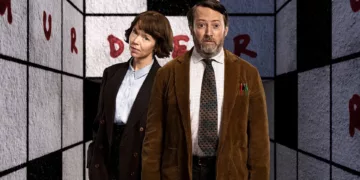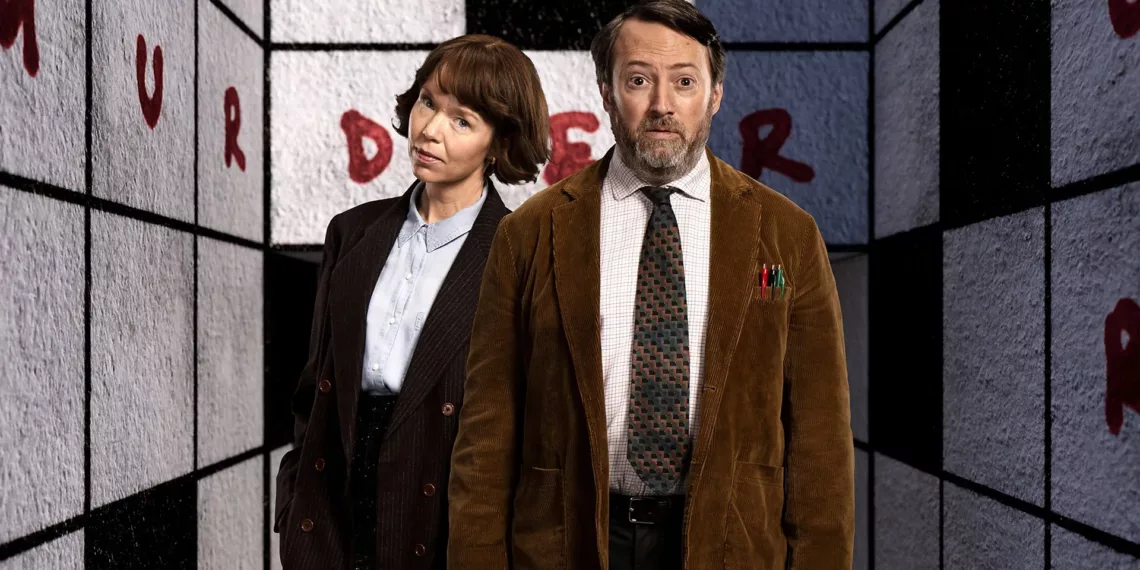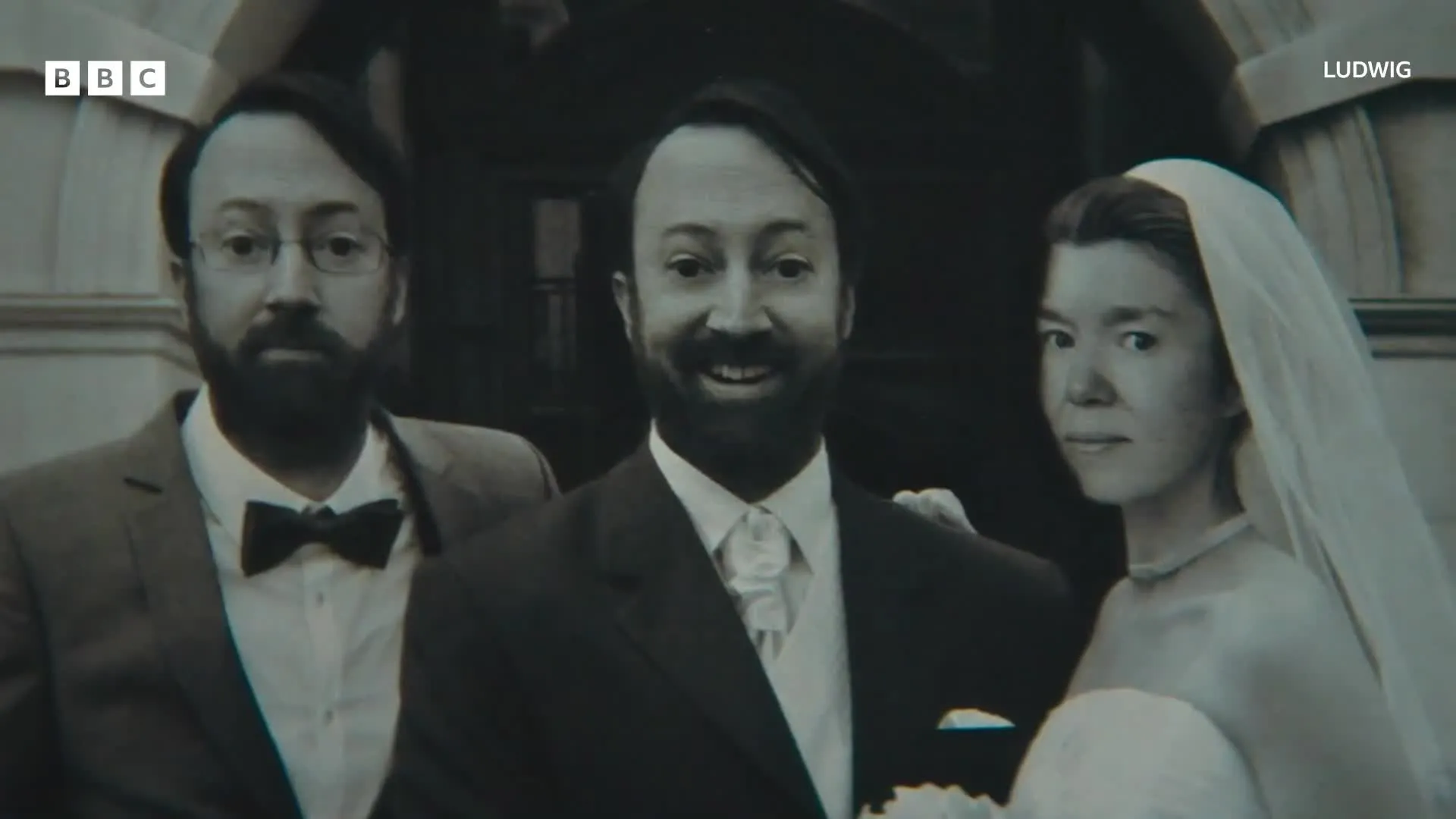David Mitchell takes the lead role of John Taylor, a man who enjoys spending leisurely days focusing on puzzles and word games. Keeping to himself in the home of his youth, John’s world is suddenly upended one evening with an unexpected phone call from Lucy.
Her husband James, John’s identical twin brother, has mysteriously vanished without a trace. A police detective, Lucy, suspects James’ disappearance relates to a case he had been investigating covertly. With no one else to turn to, Lucy recruits the socially withdrawn John for an improbable plan.
Posing as his missing sibling, John must infiltrate the police department in hopes of finding clues to solve the mystery of James’ whereabouts. What begins as a reluctant impersonation soon pulls John deeper into the complex casework as his logical problem-solving skills prove valuable to the investigation.
This six-part BBC series follows John’s foray into adapting to his twin’s life, all while peering into the disappearance that launched this unthinkable deception. Blending elements of comedy, mystery, and drama, Ludwig presents an intriguing premise that lets David Mitchell fully embrace his talents in a new genre role.
Protagonists and Performances
At the center of it all is David Mitchell as John Taylor. A lifelong puzzler, John prefers the company of crosswords to people. But when his police detective brother vanishes, John reluctantly leaves his reclusive world to help solve the mystery. Mitchell excels at portraying John’s social anxiety and peculiar mind. As he navigates impersonating his gregarious twin, John emerges as a lovably awkward hero.
Key to motivating John’s mission is Anna Maxwell Martin’s Lucinda. Still reeling from her husband’s disappearance, Lucy recruits the uncertain John. Martin brings nuance to Lucinda’s complexity—addressing a crisis while wrestling her own doubts about James. Her rapport with Mitchell’s John anchors the heart of the story.
Further elevating the show are supporting actors like Dipo Ola. Playing John’s partner Russell, Ola brings an air of cool intrigue. Their dynamic makes an unlikely yet effective crime-solving duo. Elsewhere, Izuka Hoyle is a standout as the no-nonsense DS Alice Finch, keeping John on task. Dorothy Atkinson also lends gravitas as their boss Carol.
Together, this troupe breathes life into stock roles. But greater depth comes through subtle moments addressing how John affects and is affected by each character. Their evolving bonds strengthen the show’s earnest charm.
Special appearances are also a treat. From comedy veterans like Karl Pilkington bringing levity to theater knights like Derek Jacobi lending gravitas, every role is a joy. But ultimately, it’s the interplay between leads Mitchell and Martin that makes Ludwig worth unraveling.
A Puzzle Propels the Plot
At the heart of Ludwig lies a mystery—what befell James Taylor? His vanishing pulls his puzzle-loving brother John from isolation and sets the story in motion. As John poses as James under Lucy’s request, he’s thrown into an active role to solve the case.
Week by week, new puzzles emerge for John to unravel. A pattern forms where individual crimes-of-the-week intersect with the core question of James’ fate. John lends his logical mind, helping the police unpack each situation piece-by-piece. Through it all, one man’s disappearance lingers as the series’ driving force.
Balancing intrigue and humor isn’t easy, but Ludwig finds success. The premise plays for laughs as John flounders in James’ shoes. Yet dramatic tension rises in searching for clues. Lighthearted moments relieve pressure while mysteries keep the momentum flowing.
Answers eventually surface, yet not all at once. Revelation arrives through peeling back layers, a gratifying process for any puzzler. Loose threads connecting crimes to James weave together, with the overall plot and each case enhancing one another. Resolutions satisfy without simplifying human dilemmas to easy fixes.
In Ludwig, puzzles don’t just decorate the story; they propel it forward in an engaging way. John’s skills prove central to progress, just as personal mysteries like James’ fate touch characters on deeper levels.
Blending Humor and Mystery
Ludwig poses a challenge: how do you find laughs in a missing persons case? The show tactfully balances comedy with drama through Mitchell’s antics and the mystery’s intrigue.
John’s bumbling attempts to impersonate his twin inject lightness into a heavy situation. Viewers share smiles at his social fumbles while invested in discovering what befell James. Subtle humor arises naturally from John’s character without belittling the story’s serious core.
The case-of-the-week format keeps things lively, with new puzzles surfacing each episode. Yet addressing one crime never discounts another’s real-world impact. Victims feel authentic though not glorified.
While drawing on familiar murder mystery tropes, Ludwig adds refreshing twists. John’s fresh eyes question norms while respecting police procedure. Unusual motives emerge from humanizing even the unlikeliest suspects.
Viewers are left pondering Big Questions longer than usual thanks to minimal exposition. Answers fulfill curiosity without explaining everything. Life’s gray areas remain as the dramasatisfies our need for justice.
Between impostor hijinks and an overarching mystery, the show strikes a balance. You’ll laugh and lean forward in equal measure. Its heartfelt characters feel worth rooting for across this pleasingly peculiar blend of genres.
Perhaps most impressive is how Ludwig’s tone makes its multiple tasks seem effortless. The result is a rich, engaging story told with equal parts class and cheek.
Threads That Bind
Posing as one’s twin poses unique challenges. For John Taylor, donning brother James’ life puts his very identity under the microscope. His logical mind wrestles with portraying another’s emotions.
Family ties face scrutiny too as Lucy and John view their blurred roles. Lingering hurts from the past emerge alongside new understandings. Through it all, their bond strengthens in supporting each other. behaviors confound John, who favors rational solutions over messy feelings. But witnessing police work up close, he gains appreciation for humanity’s complexities. Empathy grows alongside his sleuthing skills.
When cases climax, the answer lies not in deductions alone. Combining logic with compassion holds more truth about why people act as they do.
Meanwhile, puzzles provide solace from life’s difficulties. John finds peace in crossword puzzles that exercise his mind. Fans further enjoy Ludwig for similar escapist reasons, unwinding with each new mystery.
Throughout, diverse yet interwoven themes give the story depth. Family, identity, and the gap between logic and emotion resonate on multiple levels. Threads of relatability bind viewers to the compelling whole.
Capturing Character on Camera
Mitchell flourishes as the unlikely sleuth John Taylor. Viewers share every twitch of social discomfort as Mitchell inhabits the role. Yet beneath awkwardness lies a perceptive, curious man emerging through this unlikely opportunity.
Keys to the story’s heart, Anna Maxwell Martin ensures we feel Lucy’s mix of defiance and longing. Her dynamic alongside Mitchell drives the intrigue forward.
Around them, characters spring to life through supporting actors. Izuka Hoyle’s no-nonsense DS lights fire under John. Dipo Ola as Russell charms with charm and mystery. Each player makes the most of their roles.
Guiding the cast, direction places us firmly in John’s mindset. Scene pacing and shots draw us into his singular way of witnessing the world. Familiar Cambridge locales lend authenticity to the surroundings of this peculiar tale.
Musical choices perfectly punctuate moments. From classical cues to scored sequences, soundtracks shift mood yet maintain cohesion. Production craft ensures every component fits together in service of character and plot.
Together, these aspects weave a spell. We become so immersed that the cast feels less like actors and more like people whose lives we’ve begun to share. Through their collaborations, production rises to let characters compellingly carry the story.
Ludwig’s Engaging Mystery
David Mitchell excels in the role of reluctant sleuth John Taylor, guiding an enjoyable blend of humor and intrigue. With his social discomforts and puzzle passion, Taylor invites laughs while sparking curiosity about each new case.
Mitchell and co-star Anna Maxwell Martin share a believable rapport central to keeping viewers invested. Around them, characters emerge distinctly through committed performances. Production values heighten the atmosphere.
A few storyline quirks mean Ludwig may not satisfy hardcore mystery fans. Yet its balance satisfies as lighthearted fun without trivializing serious themes. Each story piece fits together snugly like a Sunday crossword.
Overall, this proves a charming diversion and merits devoted puzzlers. Its heart and humor leave you rooting for its characters, hoping clues to their journeys may continue unfolding. While formulaic in structure, Ludwig wears his familiar coat charmingly thanks to the talents involved. Their strengths make this puzzling drama worth solving.
The Review
Ludwig
Ludwig proves a delightfully quirky mystery-comedy that engagingly blends laughs and intrigue. David Mitchell shines as the socially awkward puzzle master thrust into an unlikely sleuthing role, skillfully carrying viewers along each episode's new case. Warm performances and witty writing make for enjoyable diversion with just enough complexity to spark contemplation beyond the final scene.
PROS
- Charismatic central performance from David Mitchell
- Clever blending of comedy, drama, and mystery genres
- Engaging character dynamics and interactions
- Episodes maintain a sense of fun while advancing serialized mystery.
- Puzzles and clues incorporated naturally into plots
CONS
- Occasional predictability of cases-of-the-week
- John's character develops somewhat formulaically.
- Premise becomes stretched the longer the impersonation continues.
- Pacing slows as series progresses.





















































